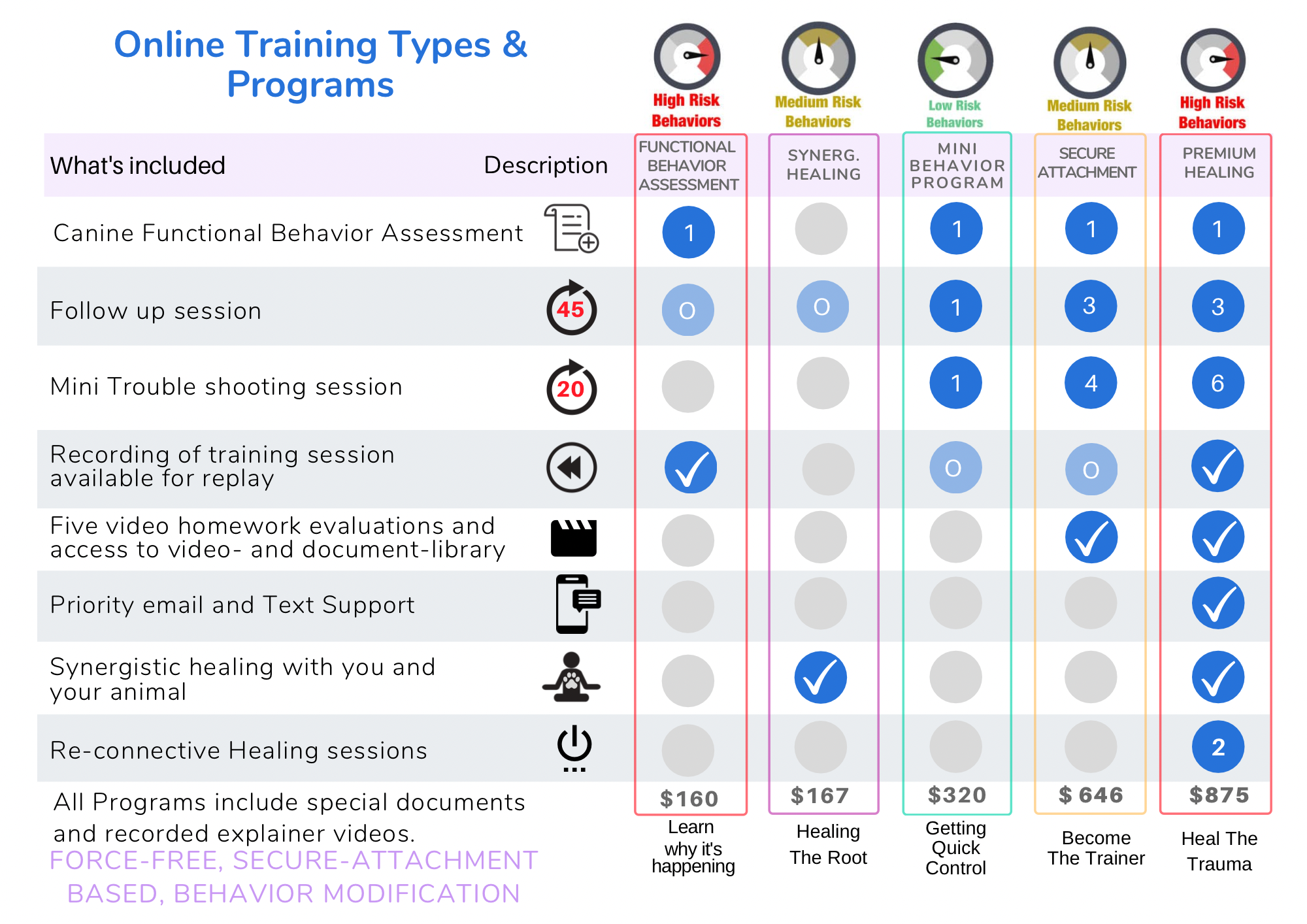TrAuma-infOrmed CANINE BEHAVIOR ASSESSMENT, TI-C-BA
($160.00)
Struggling with severe or complex behaviors?
Have you worked with a veterinary behaviorist or trainer but had seen no improvement?
Let’s find out what your dog is struggling with and get her the help she needs.
Often ignored, trauma can become the central defining experience that determines patterns of thinking, feeling, and acting. Patterns can persist after having been originally designed to navigate an unsafe world. Trauma-related patterns are held in place by automatic, non-conscious physical and psychological habits.
When you are dealing with a dog that shows fear, frustration, avoidance, or other emotion-based behaviors, you should suspect trauma first.
A Trauma-Informed Canine Behavior-Assessment ( TI-C-BA) Session is the best way to figure out what triggers a Canine behavior problem. The information is used in designing a Holistic Behavior Healing Plan ( HBHP) to address problem behaviors and prevent them from happening in the future.
We will search for the “Why does my dog show this behavior, and what does my dog feel out of this situation?” During the online video consultation, we will:
discuss the the root cause of the dog’s behavior,
How to manage existing behaviors safely
Discuss what would be acceptable alternative behaviors to work towards and goals that fit your dog and your family.
Discuss program that would work best in how to prevent the behavior to escalate, and
show you exercises to improve the dogs communication skills
We will need
Adoption History shelter evaluations, surrender info, etc.
Health History vaccinations, ongoing issues, etc.
Define the dog’s daily needs, type, play, etc.
Discuss Attachment Relationships human-dog, dog-dog, dog-home--species
Living conditions home size, crating, family members, siblings, etc.
Training history a detailed history of when, what, type, how effective, etc.
Management history and management activities in place now based on the behavioral issue.
Behavioral history when it started, what it is in measurable terms, setting events, motivating operations, antecedents, consequences.
Potential trauma will be considered as a possible reason for your dog’s complex behaviors.
We live in Pakistan with two Pyrenees. One was showing aggression towards my family. We did one online consultation. Roman's tips and advice and miraculously, the relationship between my mom and my dog healed!!
What’s In It For You?
The huge benefit of an Online Behavior Assessment is that it allows us a direct observation of the dog’s character and discuss problem behavior under naturally occurring conditions, without the presence of an additional distraction by a trainer or adding stress when traveling to a location.
The Trauma-Informed Canine Behavior-Assessment (TI-C-BA) Session is one of three parts of a behavior modification system. Performing the TI-C-BA is the first step towards discovering the Holistic Behavior Profile which will then determine the Behavior Healing Plan.
Before we start our treatment plan we need to:
Identify the roots of your dog’s or dogs’ behaviors
Capture all environmental factors that affect your dog or dogs and their behaviors
Isolate trauma or underlying conditions that need to be prioritized
Understand the families dynamics and social systems that need improvement
The Big Picture
Through this process, we are able to define, understand, and identify solution options for challenging canine behaviors. This system is based on the logic that dogs are sentient being, have emotional and biological needs, offer many different behaviors that may serve more than one function, that dogs don’t live in a natural environment, and have experienced at least one trauma when removed from their litter.
However, the reason the dog offers a behavior may be affected by factors such as:
Genetics (breed traits)
Environmental (free, semi-free, pet, etc.) everything that affects your dog. From family systems to feeding times
Dogs come to our lives with a purpose.
Trauma (medical, ancestral, pre natal, early puppy, physical and emotional abuse etc.) even before they are born, dogs can be exposed to stress and fear. After birth dogs who live in human environments can be exposed to situations that can cause trauma.
Medical reasons ( pain, chronic anxiety, underlaying inflammation, etc.) medical underlay conditions and even post-treatment side effects can affect your dog’s behavior.
In many simple cases the understanding and adjustment of the environmental factors and conditions are already the solution to the dogs problem.
In moderate cases, I might recommend to continue with a Mini-Behavior Program
In more complex- bite free- cases i will likely recommend the Secure Attachment Program
And in severe cases I recommend the Behavior Healing Program
“This was just the best! I highly recommend Roman Gottfried! He showed me some very simple changes I needed to let Skye - Great Pyrenees- know I had her back. She doesn’t need to be reactive because I’ll take care of her. My demeanor and the way I held the leash told her I was scared so she’d better be too!! Amazing!!
The main thing I was doing wrong with Skye was holding her leash to tight and transmitting my anxiety to her. It’s basically me learning to let Skye know, “It’s ok, girl. We’ve got this. I’m going to help you. You don’t have to save us!”
If you could have seen her aggression towards Sandy, the stuffed dog, in the beginning it would have blown you away!! Roman can even do some training online via conference call.
It will be the best money you ever spent!!
I wish I could go back! He’s so good!! ”
Read more testimonials
finaly
Finally, we will discuss your goals, and what you hope to achieve from the behavior consultation. You will receive exercises and instructions to stabilize the situation until your next appointment.
Note: The behavior assessment is also included in our behavior programs.
If we see it necessarily to upgrade to a behavior program, the behavior assessment will be credited towards the program.

